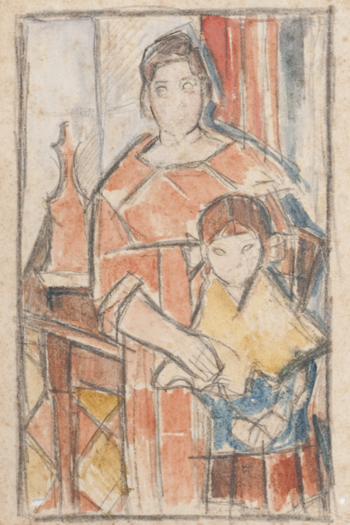It’s been said the mother-daughter relationship is the most complicated dynamic around. Therefore, most of us can see why eating disorder behaviors often arise within these relationships. The influential modeling of mother on daughter impacts her beauty values.

But the issue goes beyond just appearance; the enmeshment creates a tug of war for control and autonomy.
“…Daughters were more likely to be dieting when they had mothers who reported feeling less in control of the daughter’s activities as well as if both mother and daughter saw it as important that their relationship lack boundaries (i.e., they were enmeshed). Daughters were more likely to be dissatisfied with their bodies when their mothers reported feeling both less in control of the daughter’s activities and feeling the daughter did not have a right to her own autonomy as well as if the mother saw it as important that their relationship lack boundaries…”
“How Do Mothers Contribute to Their Daughter’s Eating Disorders and Weight Concerns?”
www.healthyplace.com
I have had such battles with my mother. And they were amplified by my extreme eating disorders in my adolescence and young adulthood.
Indeed, my eating disorders fully flared as declarations of independence and spite. Resentment festered as it seemed, no matter what I did, Mom wanted me to be an extension of herself rather than have me become my own separate person. Reeling from this hope-deficient agenda of hers, I wanted to exert control by any means necessary. And that soon became my acts of starvation and my emaciated anorexic appearance. I wanted to punish her- and if I died in the process, so be it.
I know it sounds extreme. It is extreme. Eating disorders are about more than just food or being thin. It speaks to the deeper issues, the unresolved, painful, abusive and complicated realities and wounds already existing in many a family dynamic. And it’s not about placing the full blame on mothers. There are many aspects which contribute to disorder; nevertheless, family is a dominant factor.
Families of people with Anorexia Nervosa:
- Enmeshed, overprotective, conflict-avoiding
- Unresponsive to patient’s self-expressions
- Independence is discouraged
- Patient overly dependent on parents
- Parents may urge young daughters to lose weight
Families of People with Bulimia Nervosa:
- Parents are critical and detached
- Characterized by hostile enmeshment
- Non-nurturing
- Emotionally unresponsive
- May have an obese parent, a parent with an eating disorder, or who may have been overweight themselves during childhood.
Ohio State University FactSheet. Used with permission.
But, with that being said, enmeshment seems to still be a largely mother-daughter dynamic. Therapists have long stated the same sex parent is, indeed, the most influential person in the child’s life. So, it stands to reason that when mother is unhealthy/unhappy herself, her female child, most likely, is as well.
And sometimes, if brain chemistry, genetics, environment and enmeshment are all there, disordered eating and image responses result.
It has to do with issues. We all have them. But, concerning enmeshment, one needs to identify, separate and address those issues. A mother’s value system and personal experiences need to be her own. It’s not healthy to transfer those things onto her daughter.
Through the years, I’ve frequently encountered the dysfunctional relationships of mothers and daughters. By the time they cross my path, daughter is usually a self-destructive anorexic or bulimic. Mother is often confused and wondering, “What happened?”
Disorder is not an overnight thing. It represents years – even generations – of many gradual, but still painful and traumatic mindsets and experiences. And this gets traced back to the individual value systems. It’s about asking the questions, answering them and claiming the truth. Superimposing your answers onto anyone else rarely breeds a healthy, fully-realized individual who is comfortable in his/her own skin.
This is especially the case for females, as they already struggle to accept themselves as unique beings. Life often penalizes anyone who does not fit the attractive and pleasing mold. Therefore, it’s critically important to positively arm each female with the truth of who, exactly, she is.
There’s even more of an urgency when it comes to the mother-daughter relationship. Both need to ask and answer such questions as…
What are your values?
How do you handle…
…Conflict? How does she?
…Sadness/Grief? How does she?
…Anxiety/fear? How does she?
What do you view as right? As wrong?
What are your realized and unrealized dreams? What do you think are hers?
Part of my ongoing work and healing involves learning and enforcing appropriate boundaries. My mother didn’t learn how to do that. But that should not stop me now from learning healthier responses. It’s imperfect, painful and met with opposition. By standing in these healthy boundaries, my mother has sometimes called me silly, selfish and ungrateful. She doesn’t like my “no;” she never learned and practiced its power for herself.
And yes, even to this day, she still doesn’t understand or like the fact that I am not resembling her when it comes to all of her preferences and choices. But that’s okay. Part of my healing is recognizing the difference between being an unhealthy clone and resembling someone else. I cannot deny there is a resemblance to my mother. I see it in the mirror. It’s there. But it’s not the sum total of me. Resemblance IS NOT conforming to someone’s dysfunctional, stifling identity issues.
Instead, the healing and the recovery process are about being fully who you are, whether you are mother or daughter. It’s about separating your identity, issues included, from one another. It’s about empowering each female to know her worth and her identity.
I want to look into that mirror!
